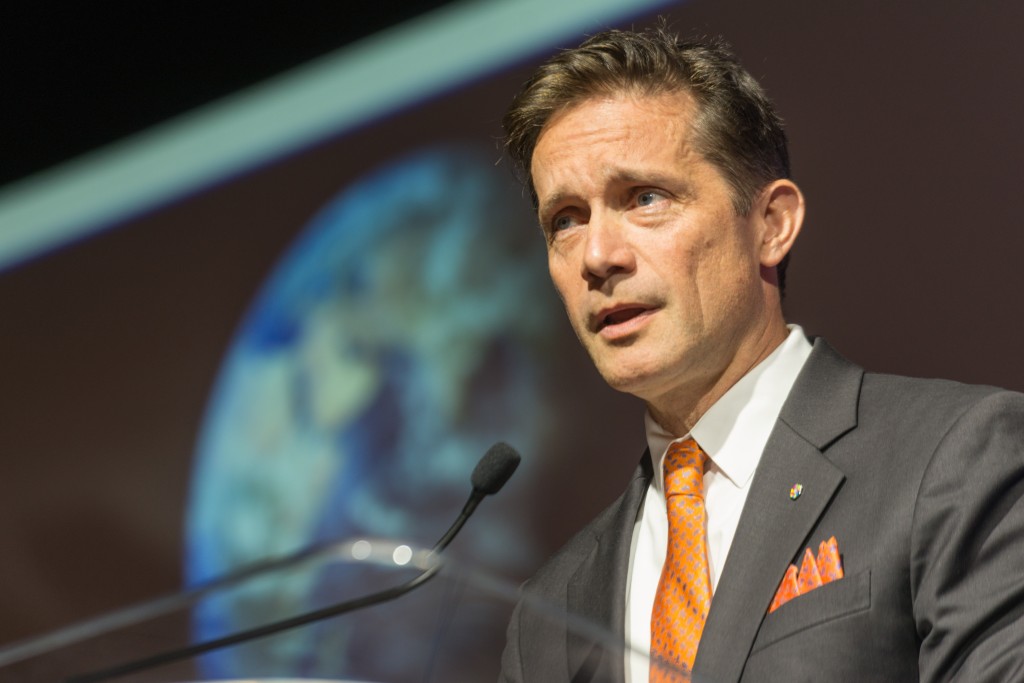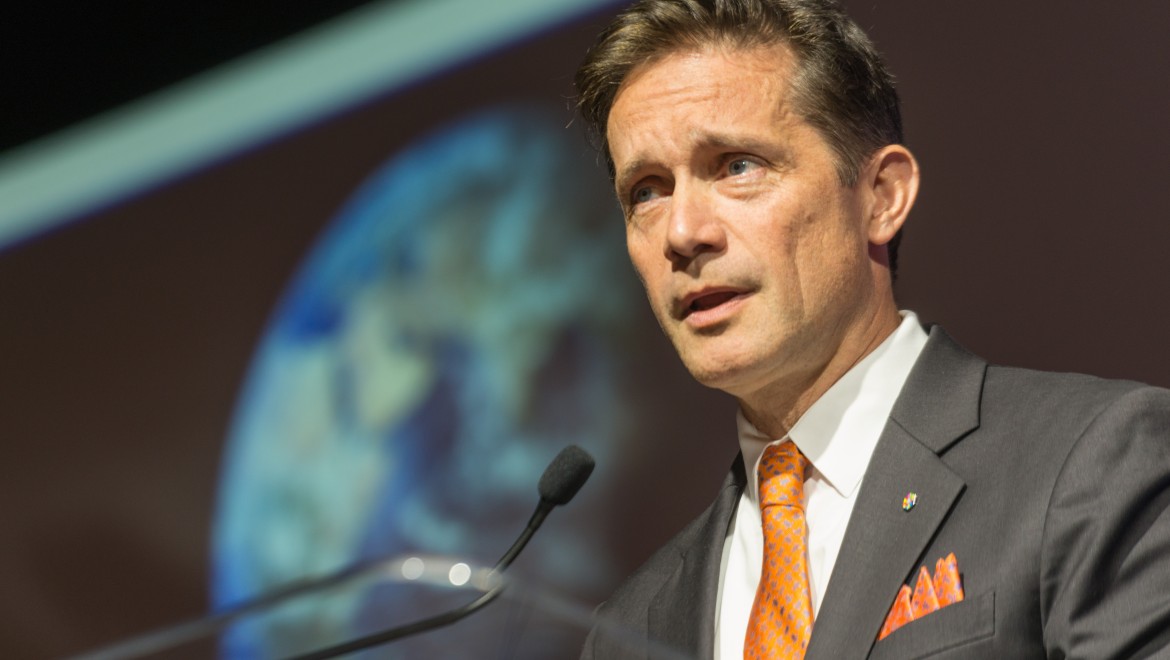Fabien Cousteau has made exploration and conservation of the world’s oceans his life’s work, and he arrived in the Cayman Islands this week with a message for environmentalists everywhere.
Mr. Cousteau, grandson of famed ocean explorer Jacques Cousteau, was the keynote speaker at the Caribbean Transitional Energy Conference on Thursday. He warned the audience that they face a “monumental time in history” and “the most important set of decisions” that confront the planet.
The explorer referred to Earth as “this little oasis in space that we consider our home,” and said the time for debate about climate change has long passed. Now is the time for action, he said, and the citizens of island nations are on the front lines of a battle that could ultimately wreak havoc on their shores.

Fabien Cousteau speaks passionately about the need for more undersea exploration. – Photo: Spencer Fordin
“How do you fill a bucket? One drop at a time,” he said. “And the more synergies, the more activity, the more positive momentum, the more innovation that’s implemented in the island nations – who are at the forefront of this problem – the better off the rest of the world will be. And hopefully the big guys up north will start paying attention. Because at the end of the day, we’re all connected.”
Mr. Cousteau, a self-described oddball at the conference because of his lack of business expertise, lauded local governments and companies for moving toward renewable energy. Beyond wind and solar, he said, there’s even more potential that could be unlocked in ocean thermal energy.
OTEC, ocean thermal energy conversion, could someday provide more than nine times the current global electrical needs without significantly impacting the environment. But first, said Mr. Cousteau, a lot more research and innovation must take place in order to unlock its potential.
“I always have this one comment for educators out there,” he said. “I’m a big proponent of STEM education, and I say, ‘You know, the one thing I learned in school is that the ocean represents 72 or 73 percent of the Earth’s surface.’ But that’s a two-dimensional system you’re talking about. We live in a three-dimensional world. … If you take into account the third dimension, that’s 99 percent of the world’s living space within which almost 95 percent of the world’s living biodiversity thrives.”
Just 5 percent of the world’s oceans have been explored, according to Mr. Cousteau, and nearly 100 times more has been spent on space exploration than on exploring the seas. With a little time and energy underwater, he said, many of the Earth’s mysteries can be unlocked.
“As time went on, exploration and storytelling became exploration with a message,” he said. “We’ve gone to places [where] no other human being has set foot, thousands of miles away from civilization, and we’ve seen very definite signs of human impact. How can people protect what they don’t understand? I remember my grandfather saying to me when I was growing up … ‘People protect what they love.’”
Jacques Cousteau famously spent 30 days in an undersea laboratory named Conshelf II, and his grandson followed with a project dubbed Mission 31. That endeavor, performed aboard undersea lab Aquarius in the Florida Keys, sent Mr. Cousteau underwater for 31 days.
Aquarius is about the same size as the International Space Station, said Mr. Cousteau, and staying underwater for 31 days enabled the inhabitants to scuba dive for up to nine hours without undergoing depressurization. And in that environment, they discovered vital information.
“That habitat has been around 26 years. Back when we did this, it was 24 years,” he said. “During those 24 years, nobody had been down long enough to see that the cold water upwelling from the trench nearby had been disrupted because of climate change-related issues. It’s been shutting down the metabolism of the coral reef because of that cold water [coming] more and more frequently and more rapidly.”
When he emerged from the water after 31 days, Mr. Cousteau said, it was the saddest moment of his career. But there’s still so much he wants to know about the undersea environment.
There’s a chance 3-D printers can be used to rebuild eroding coral reefs, said Mr. Cousteau, and vital research is needed to understand how much climate change is acidifying the underwater environment.
The keynote speaker’s exhortations were echoed by the day’s earlier addresses. Minster of Planning, Lands, Agriculture, Housing and Infrastructure Kurt Tibbetts said the government’s new energy policy can be transformational to the environment and the economy.
The Cayman Islands currently gets 99 percent of its locally produced energy from oil, and Mr. Tibbetts said the government hopes to get 70 percent of electricity from renewable sources by 2037. Sun, sea and wind will all play into the effort to make Cayman energy independent and environmentally friendly.
“Achieving this objective will require all stakeholders along the energy continuum, from the politicians to the utility providers and the energy regulators,” said Mr. Tibbetts. “Local entrepreneurs and small business owners are already making significant headway bringing expertise, innovation and initiative to the table. I therefore believe the 70 [percent] target is realistic and attainable, and I’m optimistic that the combined efforts of all concerned will not only achieve the target but surpass it.”
Chris Duggan, vice president of Dart Enterprises, spoke to the audience about responsibly building developments on Cayman. Dart operates under a policy called “Future Proofing,” which combines long-term vision, sustainability, focus on quality, technology, and site planning.
Mr. Duggan spoke in detail about all the technological enhancements of the conference’s venue, the Kimpton Seafire Resort, and about the solar energy capacity of Camana Bay. Economic benefits and environmental benefits equal social benefits, said Mr. Duggan of a simple operating philosophy.
Business titan Richard Branson, founder of Virgin Group, was not able to attend the conference but appeared via Skype to send a brief message of encouragement.
“I’d like to applaud the Cayman government for supporting this event … and for launching a new national energy policy,” he said. “As you know, I love islands. I love this region, and our islands in the Caribbean and across the world are constantly at risk from the effects of climate change.
“The urgency to protect our islands for future generations has never been higher. This is about more than preserving and protecting our environment. It’s about ensuring that places like Cayman will continue to be able to use their natural resources whilst growing sustainably.”
Original article from the Cayman Compass can be found here.

